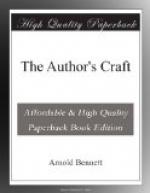The Edwardian and Georgian out-and-out defenders of Victorian fiction are wont to argue that though the event-plot in sundry great novels may be loose and casual (that is to say, simply careless), the “idea-plot” is usually close-knit, coherent, and logical. I have never yet been able to comprehend how an idea-plot can exist independently of an event-plot (any more than how spirit can be conceived apart from matter); but assuming that an idea-plot can exist independently, and that the mysterious thing is superior in form to its coarse fellow, the event-plot (which I positively do not believe),—even then I still hold that sloppiness in the fabrication of the event-plot amounts to a grave iniquity. In this connection I have in mind, among English novels, chiefly the work of “Mark Rutherford,” George Eliot, the Brontes, and Anthony Trollope.
The one other important rule in construction is that the plot should be kept throughout within the same convention. All plots—even those of our most sacred naturalistic contemporaries—are and must be a conventionalisation of life. We imagine we have arrived at a convention which is nearer to the truth of life than that of our forerunners. Perhaps we have—but so little nearer that the difference is scarcely appreciable! An aviator at midday may be nearer the sun than the motorist, but regarded as a portion of the entire journey to the sun, the aviator’s progress upward can safely be ignored. No novelist has yet, or ever will, come within a hundred million miles of life itself. It is impossible for us to see how far we still are from life. The defects of a new convention disclose themselves late in its career. The notion that “naturalists” have at last lighted on a final formula which ensures truth to life is ridiculous. “Naturalist” is merely an epithet expressing self-satisfaction.
Similarly, the habit of deriding as “conventional” plots constructed in an earlier convention, is ridiculous. Under this head Dickens in particular has been assaulted; I have assaulted him myself. But within their convention, the plots of Dickens are excellent, and show little trace of amateurishness, and every sign of skilled accomplishment. And Dickens did not blunder out of one convention into another, as certain of ourselves undeniably do. Thomas Hardy, too, has been arraigned for the conventionalism of his plots. And yet Hardy happens to be one of the rare novelists who have evolved a new convention to suit their idiosyncrasy. Hardy’s idiosyncrasy is a deep conviction of the whimsicality of the divine power, and again and again he has expressed this with a virtuosity of skill which ought to have put humility into the hearts of naturalists, but which has not done so. The plot of The Woodlanders is one of the most exquisite examples of subtle symbolic illustration of an idea that a writer of fiction ever achieved; it makes the symbolism of Ibsen seem crude. You may say that The Woodlanders could not




